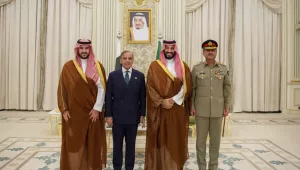President Obama's focus on Iran in his State of the Union speech was telling. Of all the international threats the United States faces this year, Iran is the most worrisome. Its radical government has withstood tough sanctions and continues to drive toward a nuclear weapon. Its reclusive and contrary supreme leader, Ali Khamenei, is risking confrontation with the United States and Israel in the combustible Middle East.
There are few reasons to be optimistic about where this is heading. Iran is threatening to accelerate its uranium enrichment program by introducing powerful IR-2M centrifuges. Khamenei responded to Washington's offer of direct US-Iran talks with a defiant no. Russia and China refuse to join the United States and Europe in applying pressure on Iran to negotiate seriously. While Iran and the five permanent members of the Security Council will meet in Kazakhstan later this month, Tehran likely won't negotiate seriously until after its bitterly contested presidential elections in June.
Given this inauspicious climate, is there anything Obama can do to produce the best possible American outcome -- stopping Iran's nuclear weapons program by negotiation rather than force? That will be difficult to accomplish. Still, there are some moves the administration can make in its high-stakes chess match with Tehran to reinvigorate diplomacy. All carry risks. And to have any chance of success, liberal Democrats and conservative Republicans will need to display uncharacteristic patience and understanding for the administration's approach -- rare commodities in Washington these days.
First, Obama and Israeli Prime Minister Benjamin Netanyahu need to bring to a close their damaging public disagreement on Iran. Obama's mid-March visit to Israel is well-timed to reaffirm his pledge to stop Iran from going nuclear by either persuasion or force. He needs to persuade Netanyahu, in turn, to provide the time and space the United States will need to explore a diplomatic solution. With a possible more moderate coalition government in place, Netanyahu might be more inclined to promise no Israeli strike against Iran while Obama is focused on negotiations.
Second, Obama should give Secretary of State John Kerry the freedom to pursue a negotiated solution with Tehran. Here is where conservative Republicans need to give the administration a wide berth. Khamenei's seemingly Shermanesque refusal to negotiate is not likely his last word on this subject. One way for the United States to draw Iran into a serious negotiation is to put a much more expansive offer on the table than it has to date and challenge Iran to accept it. This might involve permitting limited enrichment for Iran's civil nuclear program in return for intrusive inspections to thwart any diversion to nuclear weapons. Such a US compromise proposal might appeal to Iranian self-interest and pride. Obama would, in effect, give Iran a face-saving exit door in this difficult negotiation. It is in our interest to explore such a deal before we consider military action.
Third, Obama and Netanyahu should continue to make the threat of force more credible to Iran. In other words, we should make it very clear to Iran's leaders that if they reject negotiations and attempt to cross our red line to a nuclear weapon, we will stop them by military force. Here is where liberals in the president's own party need to face the difficult reality of the Iran problem. Khamenei likely believes the United States is a paper tiger and that he can wait us out. We need to convince him otherwise. Threatening force, and being willing to use it if necessary, is language he will understand in the tough, hardball environment of the Middle East. In the end, this may be the best way to convince Iran to relent and agree to a peaceful solution.
This will be a complex and difficult strategy, requiring unusual American diplomatic dexterity. But its combination of toughness and compromise may be the only effective way forward. As he considers how best to outfox the Iranian leadership, Obama might recall Hans Morgenthau's warning that "diplomacy without power is feeble, and power without diplomacy is destructive and blind." It is somewhere in the alchemy of diplomacy and the threat of force that we may find the most effective way to deal -- hopefully in a peaceful way -- with the menacing Iranian threat this year.
Follow him on twitter @rnicholasburns.
Burns, Nicholas. “How the US should handle Iran.” The Boston Globe, February 14, 2013





